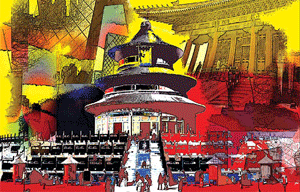Energy saving lights
Updated: 2011-11-07 07:52
(China Daily)
|
|||||||||
IT WAS GOOD NEWS FOR THE COUNTRY'S ENERGY saving targets when the central government made the decision to ban the importing and selling of light bulbs above 100 watts from Oct 1, 2012.
Following the State subsidy for the production and sale of energy saving lights, this is a further move to promote the use of energy saving bulbs instead of traditional ones. According to the policy, from Oct 1, 2014, the ban will be extended to include the importing and selling of light bulbs above 60 watts and two years later the ban will apply to bulbs above 15 watts.
If this roadmap can be followed to the letter, it is estimated that 48 billion kilowatts of electricity a year will be saved and the discharge of carbon dioxide reduced by 48 million tons a year. At the same time, the production of energy saving lights will create 15,000 jobs, with an increase in the production output value in the sector of 800 million yuan ($126 million)a year.
Without doubt this policy should be thoroughly pushed to add to the sustainability of the country's development.
However, adequate attention must also be given to the production of quality energy saving lights and the safety of used bulbs. If proper attention is not paid to these matters, the mercury pollution caused by the disposing of used bulbs in garbage bins and the consuming of even more electricity by poor quality energy saving lights will likely offset what the central government aims to achieve with this scheme.
Statistics from the State Administration for Industry and Commerce show that only 40 percent of energy saving lights in the country are of the required quality standard, and the percentage is as low as 20 percent in some localities. A test by the Beijing Consumers' Association found that 70 percent of energy saving bulbs randomly tested in 33 plants in Beijing, Shanghai and five provinces did not reach the energy-saving standard required and 20 percent did not save any electricity at all compared with ordinary light bulbs .
When it comes to the disposal of used energy saving lights, there are as yet no rules and institutions for their collection and safe disposal. The mercury from an ordinary energy saving light, if it leaks and seeps into the ground, will cause pollution to about 1,800 tons of underground water.
Now most Chinese residents do not have such knowledge and most just throw their used energy saving lights into garbage bins. Even if they do know such lights cause mercury pollution, they can find nowhere to safely dispose of them.
So a ban on the imports and sales of traditional light bulbs and promoting the use of energy saving lights is only half of what is required to achieve the required goals of saving energy and protecting the environment.
The central government and its local counterparts should not take it for granted that the replacement of light bulbs by energy saving lights will naturally achieve the goals they set.











